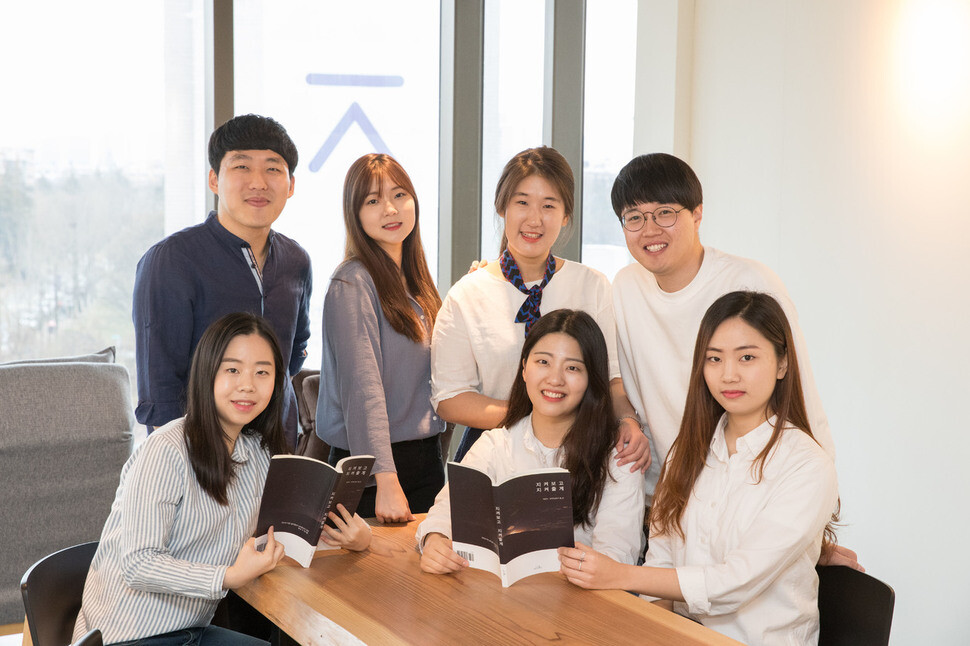hankyoreh
Links to other country sites 다른 나라 사이트 링크
University students make a book to document importance of Kopino children

University students have published a book based on case studies and research travel to the Philippines in connection with the issue of Kopinos, the children of South Korean fathers and Filipino mothers.
The seven students are 26-year-old graduate Kang Sang-deok, 24-year-old Park Go-eun (currently deferring graduation), 25-year-old Kwon Ye-ri (fourth year), 26-year-old Jeong In-yong (fourth year), 24-year-old Seo Jeong-hee (fourth year), 23-year-old Yun Ji-hyeon (fourth year), and 24-year-old Bang Ha-yeong (currently on leave) from Chonbuk National University. To carry out the project, they organized a team called “Spotlight_Dreamers.” After more than a year of efforts collecting data and visiting communities, they published the book “I‘ll Keep Watching and Looking After You,” available as an e-book and a not-for-sale hard copy.
The team’s name was intended to keep alive interest in the Kopino issue, which briefly became the focus of attention before more or less fading away. Sources reported as many as 30,000 Kopino children currently living under difficult conditions in the Philippines.
The students’ interest in the Kopino issue began in Mar. 2016. As they got to know each other through a job preparation club, they learned about an official request for resolution of the Kopino issue made during a South Korea visit by then-Philippines Prosecutor General Claro Arellano. They felt both shame and a newfound interest in the issue.
As they researched the matter, the students decided together to leave behind a record. They were upset at the way the issue had been briefly discussed by the media, only to be quickly forgotten. To gather data, they participated in Chonbuk National University’s “bestseller program,” which supports student writing activities. But they were able to do little more than piece together existing bits of information - and what books and papers existed were inadequate. Newspaper articles were often deeply polarized. Finally, they decided to visit the Philippines themselves to conduct case studies and research.
Expenses and time commitments proved an obstacle. But the project got off the ground again in June 2016, when the students were selected in a competition for school support for ideas by “adventurous students.” The following July, they flew to the Philippines and spent a week visiting five support institutions for Kopinos. They also visited two shelters offering assistance to Kopino families in South Korea.
The book contains the information they learned on the ground. It reflects their initial impressions on the difficulties of the Kopino issue, the unfortunate lives of the children they met overseas, and the anger and the children’s cleverness as witnessed by the students, along with alternative ideas. In recognition of the work’s excellence, the school agreed to make copies available in its library.
“This is something produced by university students, so it’s not a professional-quality book, but we recorded what we sensed as we traced this matter from a critical perspective,” said Yun Ji-hyeon, the youngest of the group.
“We hope it will help encourage a sustained interest in the Kopino issue, rather than just brief flashes of interest,” Yun added.
By Park Im-keun, North Jeolla correspondent
Please direct questions or comments to [english@hani.co.kr]

Editorial・opinion
![[Editorial] Intensifying US-China rivalry means Seoul must address uncertainty with Beijing sooner than later [Editorial] Intensifying US-China rivalry means Seoul must address uncertainty with Beijing sooner than later](https://flexible.img.hani.co.kr/flexible/normal/500/300/imgdb/original/2024/0517/8117159322045222.jpg) [Editorial] Intensifying US-China rivalry means Seoul must address uncertainty with Beijing sooner than later
[Editorial] Intensifying US-China rivalry means Seoul must address uncertainty with Beijing sooner than later![[Column] When ‘fairness’ means hate and violence [Column] When ‘fairness’ means hate and violence](https://flexible.img.hani.co.kr/flexible/normal/500/300/imgdb/original/2024/0516/7417158465908824.jpg) [Column] When ‘fairness’ means hate and violence
[Column] When ‘fairness’ means hate and violence- [Editorial] Yoon must stop abusing authority to shield himself from investigation
- [Column] US troop withdrawal from Korea could be the Acheson Line all over
- [Column] How to win back readers who’ve turned to YouTube for news
- [Column] Welcome to the president’s pity party
- [Editorial] Korea must respond firmly to Japan’s attempt to usurp Line
- [Editorial] Transfers of prosecutors investigating Korea’s first lady send chilling message
- [Column] Will Seoul’s ties with Moscow really recover on their own?
- [Column] Samsung’s ‘lost decade’ and Lee Jae-yong’s mismatched chopsticks
Most viewed articles
- 1[Editorial] Transfers of prosecutors investigating Korea’s first lady send chilling message
- 2[Column] US troop withdrawal from Korea could be the Acheson Line all over
- 3Xi, Putin ‘oppose acts of military intimidation’ against N. Korea by US in joint statement
- 4[Editorial] Intensifying US-China rivalry means Seoul must address uncertainty with Beijing sooner t
- 5[Exclusive] Unearthed memo suggests Gwangju Uprising missing may have been cremated
- 6‘Shot, stabbed, piled on a truck’: Mystery of missing dead at Gwangju Prison
- 7[Column] When ‘fairness’ means hate and violence
- 8China calls US tariffs ‘madness,’ warns of full-on trade conflict
- 9[Editorial] Yoon must stop abusing authority to shield himself from investigation
- 10China, Russia put foot down on US moves in Asia, ratchet up solidarity with N. Korea